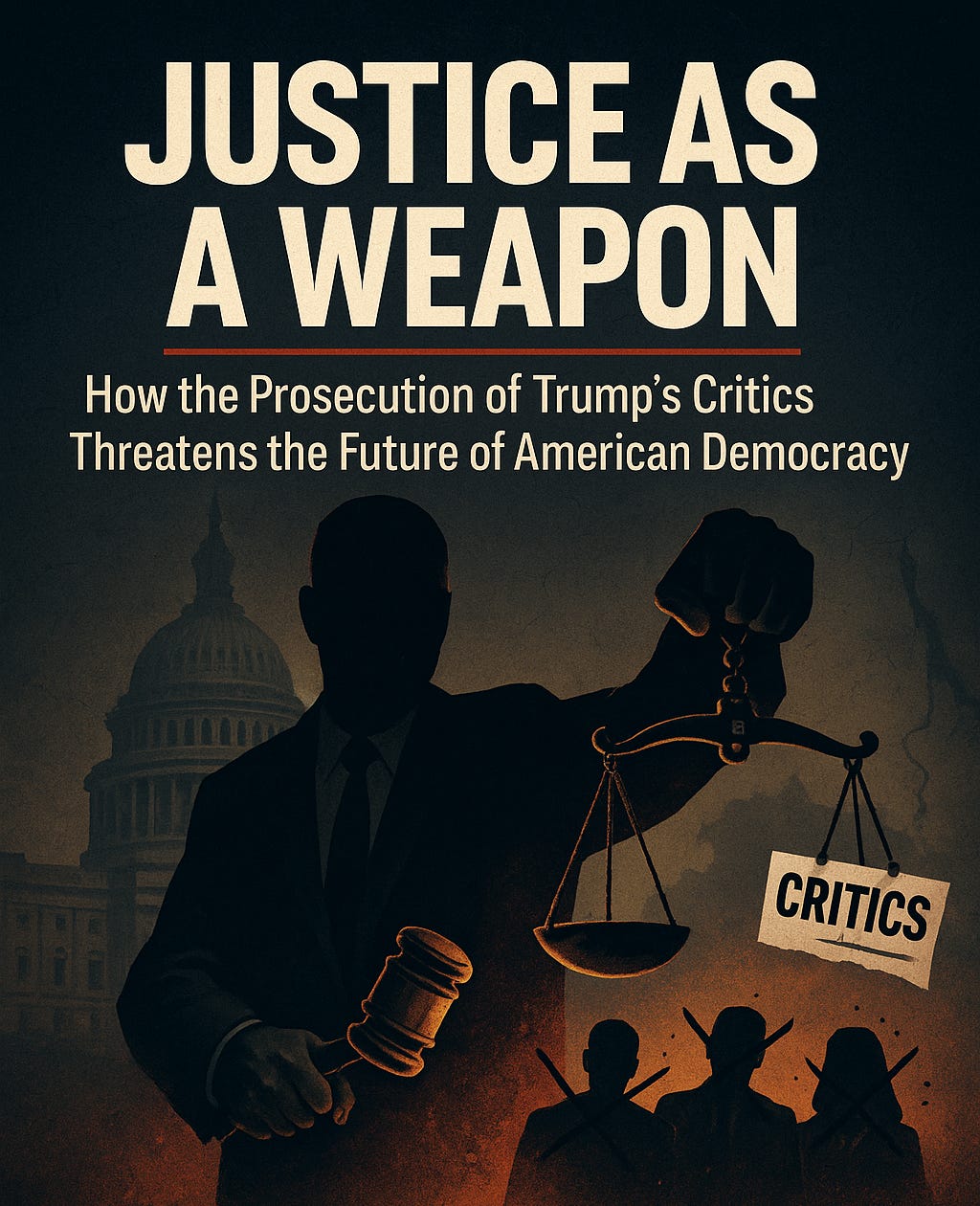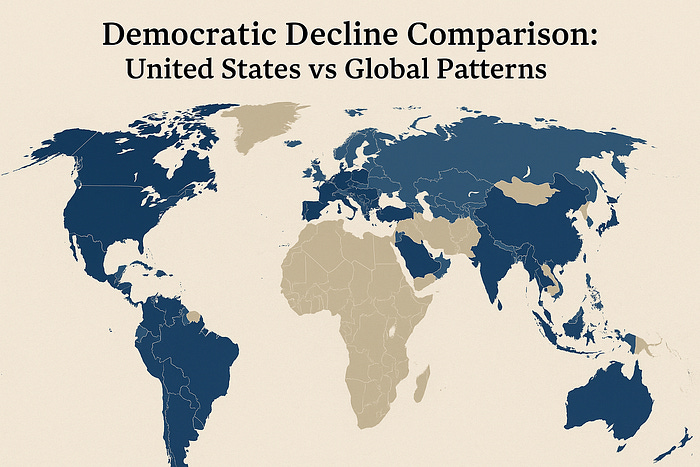Justice as a Weapon
How the Prosecution of Trump's Critics Threatens the Future of American Democracy
Executive Overview
A newly released investigation entitled “Justice Under Scrutiny: An Analysis of Federal Indictments Against Critics of Donald Trump” raises profound and urgent questions about the politicization of justice in the United States. The report examines the federal indictments of James Comey, Letitia James, and John Bolton—three high-profile individuals who publicly challenged former President Donald Trump.
Through careful legal and procedural analysis, the report uncovers a disturbing pattern: while one case (Bolton) presents legitimate legal concerns, the others (Comey and James) appear to be the result of targeted political retaliation, driven not by evidence of serious wrongdoing but by loyalty-based enforcement and presidential vendettas.
The conclusion is clear: America is standing at a precipice, where the line between justice and power is being dangerously blurred—and the implications for democracy, sovereignty, and civil liberty are nothing short of seismic.
Case by Case Breakdown
1. James Comey: False Statements or Political Payback?
Charges: False statements to Congress and obstruction of a congressional proceeding.
Context: Fired FBI Director and vocal Trump critic; key figure in the Russia probe.
Red Flags:
Trump demanded his prosecution publicly.
U.S. Attorney who refused to prosecute was removed.
Indictment pursued by Trump’s personal lawyer turned prosecutor.
Assessment: The vague charges and irregular path to indictment suggest a textbook case of vindictive prosecution, undermining basic standards of legal integrity.
2. Letitia James: Fraud Allegation or Retaliation for Winning?
Charges: Mortgage fraud—allegedly misrepresenting her use of a $137,000 property.
Context: Attorney General who led the civil fraud lawsuit that cost Trump over $450 million.
Red Flags:
Brought by the same Trump-loyalist prosecutor as Comey’s case.
Involves a minor loan infraction with no financial harm.
Investigated only after presidential pressure and political appointment of prosecutor.
Assessment: Widely seen by legal scholars as disproportionate, selective, and politically motivated—a warning sign of a justice system bent to executive will.
3. John Bolton: A Stronger Case With Political Shadows
Charges: Violations of the Espionage Act, stemming from the alleged mishandling of highly classified material.
Context: Former National Security Advisor and author of a damning memoir on Trump.
Distinguishing Features:
Investigation initiated under the Biden administration.
Prosecuted by career Justice Department officials.
Evidence considered substantial by national security analysts.
Assessment: A stronger legal case, but still politically tainted by Trump’s calls for retribution and pressure to accelerate prosecution.
Patterns of Distortion
Common Threads of Concern:
Direct presidential demands for indictments.
Removal or bypassing of career prosecutors.
Indictments brought by loyalists with personal ties to Trump.
Minor or vague legal violations inflated into federal charges.
These patterns undermine the rule of law, replacing evidence-based prosecution with what the report describes as “process as punishment”—a tactic to drain, shame, and silence political enemies regardless of conviction outcome.
What This Means for Democracy
The Collapse of Prosecutorial Independence
The U.S. Department of Justice was designed—especially after the Watergate scandal—to operate as a nonpartisan guardian of legal integrity. The ability of prosecutors to act independently of political pressure is foundational to a functioning democracy.
But if prosecutors become tools of the executive branch, America shifts dangerously close to the governance norms of authoritarian regimes, where loyalty, not legality, determines who gets punished.
Erosion of Public Trust
When political opponents are prosecuted for minor or unclear infractions, and allies are shielded from accountability, public trust in the justice system disintegrates. People begin to believe (rightfully) that justice is not blind, but targeted—based on who you are, not what you’ve done.
This breeds cynicism, disengagement, and polarization—the very fractures upon which demagogues rise.
Weaponizing the DOJ Chills Dissent
If high-profile public servants, like a former FBI Director or Attorney General, can be criminally charged for opposing the President, then no critic is safe—not journalists, not whistleblowers, not political rivals.
This establishes a “chilling effect,” where people self-censor, avoid public criticism, and withdraw from democratic engagement out of fear. The American tradition of free speech and adversarial governance is imperiled.
Sovereignty and the American Identity
The sovereign ideal of the United States rests on government by the people, for the people—not by the President, for the President.
The manipulation of justice to punish political enemies threatens to:
Undermine constitutional checks and balances
Blur the separation of powers
Encourage rule-by-fear, not rule-of-law
This trend, left unchecked, signals the emergence of a dual-track legal system: one lenient for allies, and punitive for enemies. That is not a democracy. That is a soft autocracy.
Future Repercussions
Unless reversed, these developments risk:
Normalizing retributive prosecution as a tool of statecraft.
Degrading international credibility of U.S. legal fairness.
Inviting retaliation when political power shifts—creating a vicious cycle of legal warfare.
Alienating future public servants who fear that performing their duty may make them targets.
Provoking a constitutional crisis if prosecutorial power becomes an extension of the presidency rather than a check upon it.
Conclusion: A Test of the Republic
The cases against James Comey and Letitia James are not merely about individual wrongdoing or legality—they are a litmus test for the soul of American justice.
The question is no longer just, “Were these crimes committed?”
It is now, “Is the law still impartial? Or has it been conscripted into the service of vengeance?”
The integrity of democracy depends on the answer.
If the Justice Department becomes a political sword instead of a neutral scale, then America has crossed a line—one that history shows is perilous to return from.
As the report solemnly warns:
“The law should be a shield for all, not a weapon against one’s enemies.”




Speaking of tainted justice...
John Roberts' Supreme Court 12 Worst Crimes Against American Democracy
https://thedemlabs.org/2025/10/16/john-roberts-supreme-court-12-worst-crimes-against-american-democracy/